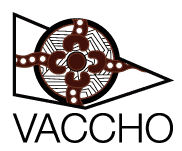The Victorian ACCO Model
The holistic model of Aboriginal Community Controlled Health Organisations.
Over the last 50+ years, the ACCO sector has developed an operating and service model that meets the unique needs of our communities.
Our model is:
• Holistic, integrated, strengths-based, and trauma-informed.
• Culturally safe healthcare combined with wrap-around social services to address the many disparities in health and wellbeing still experienced by Aboriginal Victorians.
• Recognised and endorsed by government policy at all levels.
• Significantly challenged by the fragmenting influence of funding designed for mainstream services.
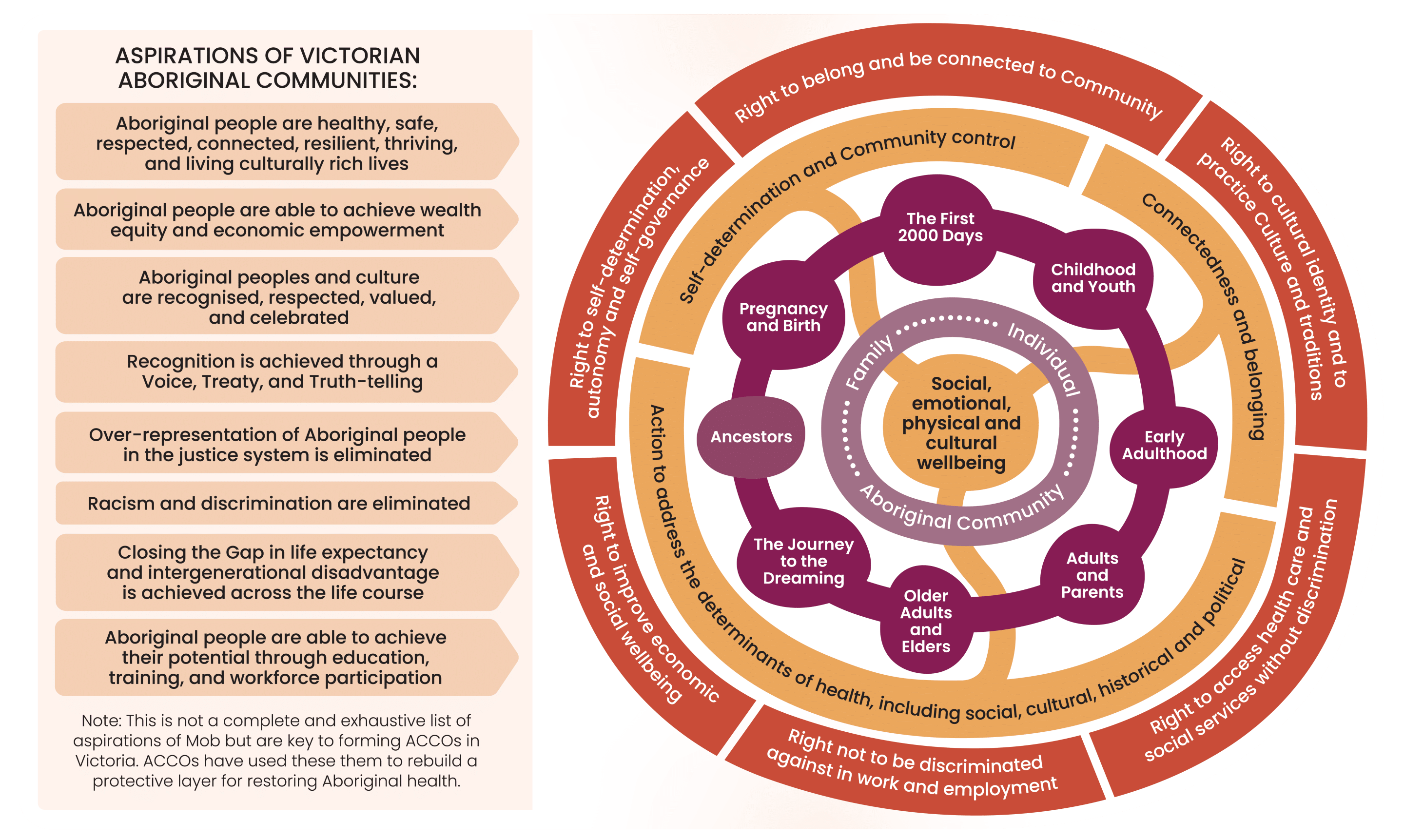
Social Impact of the ACCO Model
- Empowerment and self-determination
- Community building and resilience
- Celebration and pride in culture and identity
- Social inclusion and equality
- Economic and community development
- Social justice and respect
- Economic development and employment
- Improved quality of life
Reduced Costs to government
- Hospital and other tertiary services
- Alcohol and other drug services
- Acute mental health services
- Justice (less violence, criminal behaviour and incarceration)
- Crisis accommodation
- Family violence
- Child Protection and out of home care
- First responders (Ambulance)/law enforcement (Police)
- Social welfare costs (higher employment)
- Health care costs
Outcomes of the ACCO Model
- Improved health, social and emotional wellbeing
- Improved family and community function
- Improved connection – individual, family and community
- Increased social inclusion and participation in the wider community and civic life
- Increased engagement in education and training
- Increased workforce participation
- Reduced intergenerational trauma
- Reduced community stress and breakdown
Our model has two foundational principles and three key elements, which affirm our Aboriginal ways of knowing, being and doing. The foundational principles describe our purpose (knowing and being), while the key elements describe how our services are designed within the framework of Aboriginal Community Control (doing).
Foundational Principles
Our definition of health.
Aboriginal health encompasses physical, social, emotional, and cultural wellbeing of individuals, families, and communities. In contrast, western definitions focus on disease prevention and the treatment of individuals.
Our Rights as Indigenous People.
These are set out in the United Nations Declaration on the Rights of Indigenous Peoples and Victoria’s Charter of Human Rights and Responsibilities Act 2006.
‘Aboriginal health in Aboriginal hands.’

Key Elements
Self-Determination and Community Control.
ACCOs are independent incorporated bodies with a membership structure open to people from the local Aboriginal community. Members elect the Board, who determine objectives and performance expectations for the ACCO. For mainstream health services, these are ultimately determined by government.
ACCOs are accountable to their members and local community, meaning:
- It is not the role of government to determine or prescribe how ACCOs design their services.
- It is the role of government to partner with the ACCO sector to ensure that dedicated funding models are reliable, consistent, and designed to suit the types of services required by communities.
Connectedness and Belonging.
ACCOs seek to increase the connectedness and sense of belonging that Aboriginal people experience in themselves, within their families and within communities. Starting from birth and continuing throughout the life course, ACCOs celebrate culture, conduct ceremony, hold social events, and organise sporting and recreational activities. While these activities are valuable in their own right, creating a welcoming, trusted and healing environment encourages individuals and families to feel at ease and secure when reaching out for support and assistance, significantly reducing the barriers to accessing care and support.
Action to address the determinants of health.
ACCOs recognise that social and political factors, such as employment, education, housing, racism, and discrimination, along with the cultural and historical context of our experience surviving colonisation, have a significant impact on the health and wellbeing of individuals, families and their community. In practice, this means ACCOs integrate healthcare services with social services such as housing, financial relief, childcare, aged care, and disability services. As a result, the burden placed on individuals and families to navigate multiple mainstream systems is significantly eased, and ACCOs can provide healthcare while directly addressing the determinants of health outcomes.
Other features of the Victorian ACCO Model
Governance and Operating Arrangements
ACCOs are independent legal entities owned and governed by the local Aboriginal community. Within communities, people often refer to their ACCO as ‘the Co-op’. Each ACCO’s constitution outlines its purpose, rules, and governance structure.
Victorian ACCOs are structured as:
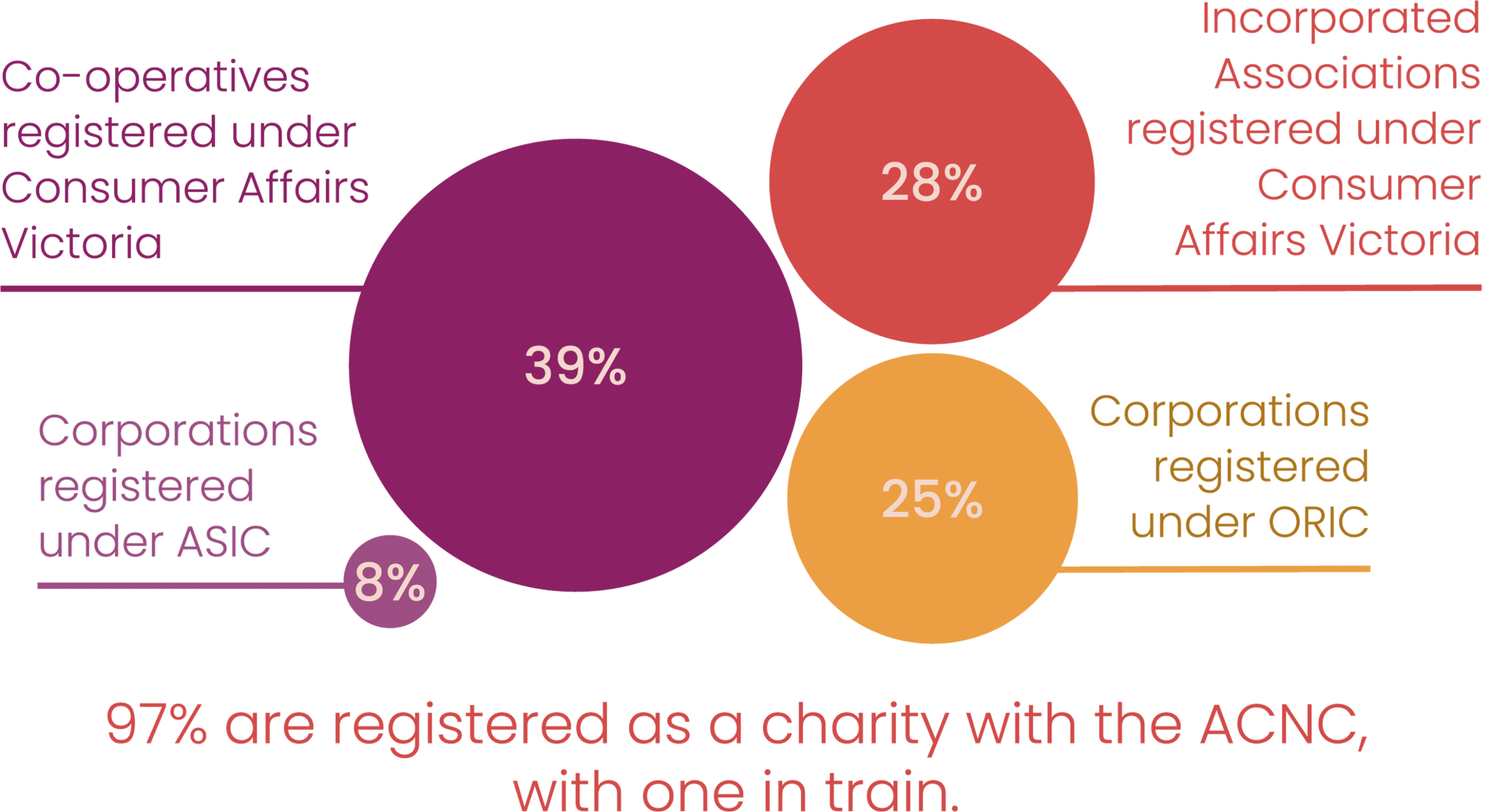
Funding and Resourcing
ACCOs seek and receive funding from many sources, including the Victorian and Commonwealth Departments responsible for Health and Social Services, including Housing, Children, Youth, Women, Men, Families and Elders, Equality, Justice and Law, Education, Training, Employment, Environment, Land, Planning, Regional Development and Business Development, and the Departments of Premier and Cabinet and Prime Minister and Cabinet. Funding may also come from government agencies such as the National Indigenous Australians Agency (NIAA) and Primary Health Networks (PHNs).
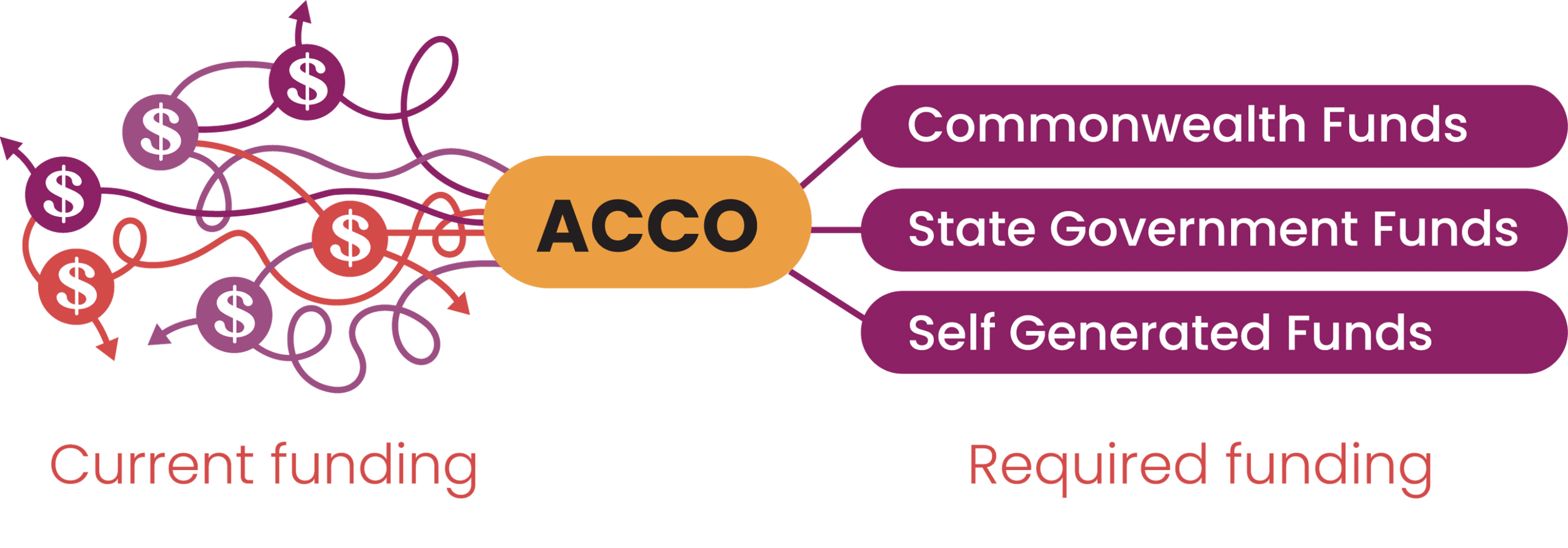
ACCOs also generate fee-for-service income through Medicare, NDIS, Aged Care and the Childcare Subsidy Scheme, but these market-based funding mechanisms are generally not financially viable for the population size, level of need and complexity of their clients. To offer these essential services ACCOs must subsidise from other income. Some ACCOs generate income from social and business enterprises, including agriculture and tourism. There is a relatively small amount of philanthropic investment in Victorian ACCOs.
Scalability
ACCOs are agile and experienced in scaling up their services in response to the changing demands and needs of the community, and from our advocacy for policy and funding changes. This will be increasingly important because the Aboriginal population in Victoria is growing at 3.8% per year, more than double the rate of the broader population at 1.6%. Between 2006 and 2021, the total population of Aboriginal people in Victoria increased by 135% to 78,696, with a median age of 24 years compared to 38 years in the broader population.
The first Victorian Aboriginal Community Controlled Health Organisation was founded in 1973. It was an Aboriginal-led response to the intergenerational impact of colonisation, and the policies of dispossession and assimilation that have caused such damage to the health and wellbeing of Victorian Aboriginal people. Since then, Aboriginal communities across the state have set up ACCOs to rebuild our health, wellbeing, connectedness, economic independence and prosperity. These are both our aspirations and our rights as the First Peoples of this country.
Through the National Agreement on Closing the Gap, the Victorian Government has committed to “Building the Community Controlled Sector”, recognising that ACCO services “usually achieve better results, employ more Aboriginal and Torres Strait Islander people, and can be given preference over mainstream services”.
Priority Reform 2 of the National Agreement commits governments to action through:
- Sustained capacity building and investment.
- A dedicated and identified Aboriginal and Torres Strait Islander workforce.
- Support provided by a Peak Body which has strong governance, policy development, and influencing capacity.
- A dedicated, reliable, and consistent funding model designed to suit the types of services required by Communities.
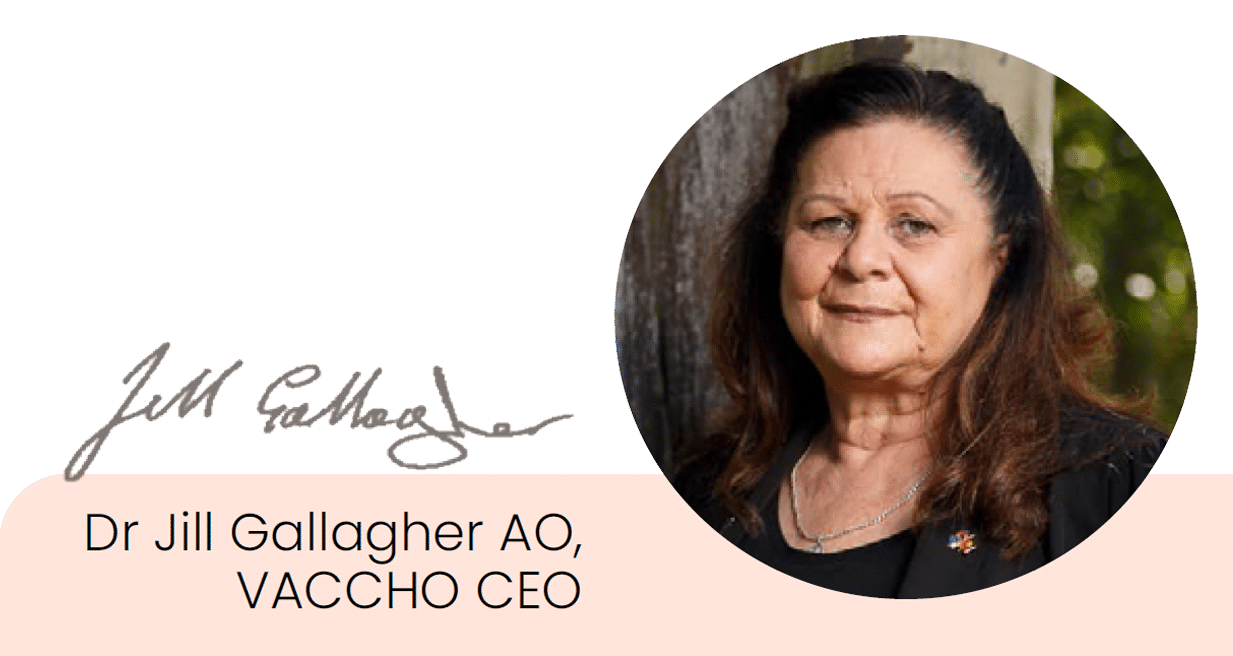
Challenges to the Victorian ACCO Model
The Victorian and Commonwealth governments have committed to supporting the holistic and integrated ACCO model, but funding remains fragmented and disintegrated. Funds are allocated through a maze of separate grants and agreements, from dozens of funding sources. Most are not recurrent, and many are for 12 months only, even though service delivery is ongoing and supporting long term change. This approach leads to challenges with:
- Finding resources to plan or develop new facilities, or maintain current buildings
- Covering costs beyond direct service delivery, such as HR, Finance, Quality and accreditation, Communications, vehicles, technology and data management. To try to cover these indirect costs, ACCOs allocate a small administrative levy across service grants.
- Workforce attraction and retention, as long-term contracts cannot be offered.
- A uniquely high reporting burden due to overlapping requirements of multiple funders, accreditation and standards reporting.
- Multiple uncoordinated data collection requirements, and a lack of data sovereignty to support the ACCO model.
Despite, long-standing government commitments to simplify funding through outcomes-based funding models, progress has been slow. To date, no substantial resources have been allocated to support this transition.
How is Quality Assured?
ACCOs comply with legislative and regulatory frameworks, the Child Safe Standards and Reportable Conduct Scheme, and maintain the following accreditations:
- Royal Australian College General Practitioners 5th Ed (RACGP)
- Aged Care Quality Standards
- Social Services Standard (Victoria)
- Child Safety Standards (Victoria)
- National Standards for Mental Health Services
- National Safety and Quality Health Service (NSQHS) Standards
- NDIS Practice Standards
- QIC Health Community Service Standards (7th Edition)
Definitions
Aboriginal
Aboriginal and Torres Strait Islander peoples living in Victoria use various terms including. First Nations, Sovereign Nations, Indigenous Australians, Our Mob/s, Blackfellas, Traditional Owners, Our Communities. In this document, we have chosen to use the term Aboriginal.
Aboriginal Community Controlled Organisation
Priority Reform Two of the National Agreement on Closing the Gap defines an ACCO (or ACCHO) as an organisation that is:
- incorporated under relevant legislation and not-for-profit
- controlled and operated by Aboriginal and/or Torres Strait Islander people
- connected to the community, or communities, in which they deliver the services
- governed by a majority Aboriginal and/or Torres Strait Islander governing body.
In Victoria, the acronym ACCO is preferred, as it better reflects the broader range of healthcare and social services offered in Victorian compared to other states.
Connection
In Aboriginal cultures, the concept of “connection” holds profound significance, encompassing a deep and holistic understanding of relationships. The idea of connection extends beyond mere physical ties, it encapsulates spiritual, cultural, social, and environmental dimensions.
Cultural determinants of health
How an individual’s cultural background, identity, and practices influence their health and wellbeing. These determinants are integral to understanding health disparities and providing culturally competent and effective healthcare.
Cultural Safety
An environment that is safe for people; where there is no assault, challenge or denial of their identity, of who they are and what they need. It is about shared respect, shared meaning, shared knowledge and experience, learning together with dignity, and truly listening.
Cultural Safety Practice
The ongoing critical reflection of health practitioner knowledge, skills, attitudes, practising behaviours and power differentials in delivering safe, accessible, and responsive healthcare free of racism.
Model of Care
A broad outline of the way a service is organised and delivered. Within the Victorian ACCO Model there are multiple models of care.
Political determinants of health
The influence of political structures, policies, and power dynamics on the distribution of resources, opportunities, and social conditions that shape health outcomes within a population. These determinants highlight how political decisions and governance structures can either contribute to health equity or exacerbate health disparities.
Self determination
While Aboriginal self-determination means different things to different people, the United Nations Declaration on the Rights of Indigenous Peoples describes it as the ability for Indigenous people to freely determine their political status and pursue their economic, social and cultural development. It also describes self-determination as a right that relates to groups of people, not individuals.
Social determinants of health
The conditions in which people are born, grow, live, work, and age, and they significantly influence health outcomes. These determinants highlight the social and economic factors that shape individuals’ and communities’ health and wellbeing.
Key Policy Commitments
- National Agreement on Closing the Gap 2020
- National Aboriginal and Torres Strait Islander Health Plan 2013–2023
- National Indigenous Reform Agreement (NIRA)
- National Health Reform Agreement 2020-2025
- Victorian Aboriginal Affairs Framework
- Korin Korin Balit-Djak
- Victorian Government, Department of Health and Human Services. Supporting self-determination: prioritising funding to Aboriginal organisations project report: Executive summary, 2019
- Aboriginal Health and Wellbeing Partnership Agreement and Action Plan
- Self-determination, treaty and truth telling through the Yoorrook Justice Commission
- Charter of Human Rights and Responsibilities Act 2006 Victoria
References
- United Nations Declaration on the Rights of Indigenous Peoples
- Robyn Williams. Cultural safety-what does it mean for our work practice?
- Ahpra. Aboriginal and Torres Strait Islander Health Strategy
- Mental Health Commission of NSW. Journey of Wellbeing: A Preliminary Aboriginal Model of Care based on documented examples of best practice across NSW
- VACCHO. On Solid Ground: Strategic Plan 2021-2026
- ABS. Final 2021 Census estimates -Aboriginal and Torres Strait Islander Australians
Contact us
If you have any questions related to the Victorian ACCO Model contact us via the enquiry form below.
